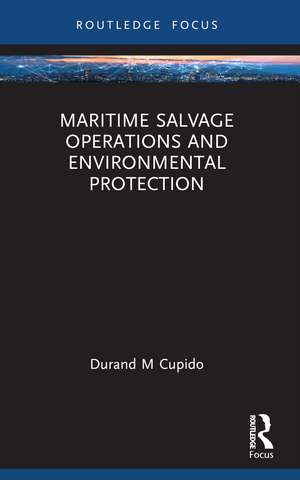Maritime Salvage Operations and Environmental Protection: Routledge Research on the Law of the Sea
Autor Durand Cupidoen Limba Engleză Paperback – 26 aug 2024
| Toate formatele și edițiile | Preț | Express |
|---|---|---|
| Paperback (1) | 152.19 lei 22-36 zile | +5.57 lei 6-12 zile |
| Taylor & Francis – 26 aug 2024 | 152.19 lei 22-36 zile | +5.57 lei 6-12 zile |
| Hardback (1) | 354.83 lei 22-36 zile | +16.03 lei 6-12 zile |
| Taylor & Francis – 20 ian 2023 | 354.83 lei 22-36 zile | +16.03 lei 6-12 zile |
Preț: 152.19 lei
Nou
Puncte Express: 228
Preț estimativ în valută:
29.12€ • 30.49$ • 24.10£
29.12€ • 30.49$ • 24.10£
Carte disponibilă
Livrare economică 17-31 martie
Livrare express 01-07 martie pentru 15.56 lei
Preluare comenzi: 021 569.72.76
Specificații
ISBN-13: 9781032325354
ISBN-10: 1032325356
Pagini: 114
Dimensiuni: 138 x 216 x 9 mm
Greutate: 0.15 kg
Ediția:1
Editura: Taylor & Francis
Colecția Routledge
Seria Routledge Research on the Law of the Sea
Locul publicării:Oxford, United Kingdom
ISBN-10: 1032325356
Pagini: 114
Dimensiuni: 138 x 216 x 9 mm
Greutate: 0.15 kg
Ediția:1
Editura: Taylor & Francis
Colecția Routledge
Seria Routledge Research on the Law of the Sea
Locul publicării:Oxford, United Kingdom
Public țintă
Academic and PostgraduateCuprins
Introduction
I Environment first, in the pursuit and balancing of values via the law
II Historical overview of salvage: Changing contexts and the pursuit of values
III Theory of salvage and environmental protection
IV The International Convention on Salvage 1989 and the environment
V Salvage operations within coastal State marine environmental protection measures and salvors’ environmental services under international instruments outside of the law of salvage.
VI Contracts between Coastal States and Salvors as the Legal Regulatory Framework for Environmental Services in the Context of Salvage Operations
Conclusions
I Environment first, in the pursuit and balancing of values via the law
II Historical overview of salvage: Changing contexts and the pursuit of values
III Theory of salvage and environmental protection
IV The International Convention on Salvage 1989 and the environment
V Salvage operations within coastal State marine environmental protection measures and salvors’ environmental services under international instruments outside of the law of salvage.
VI Contracts between Coastal States and Salvors as the Legal Regulatory Framework for Environmental Services in the Context of Salvage Operations
Conclusions
Notă biografică
Durand M Cupido is Lecturer in Law at the University of Essex, UK, and a qualified attorney of the High Court of South Africa (non-practising). Durand has practised as a commercial litigation attorney and continues to advise on maritime law and related matters.
Descriere
This book questions the use of salvage law as legal regulatory framework for the remuneration of environmental services in salvage operations, proposing that such services should be based on direct contracting between commercial salvors and coastal States.














